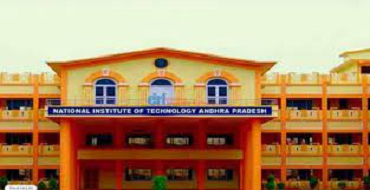
TADEPALLIGUDEM, ANDHRA
Biovalorisation is a process of transforming waste to value-added products by employing microorganisms and biological treatment procedures. Thus, contribute significantly to India’s economy to achieve the goals of National Missions like Swachh Bharat, and Make in India - providing a clean environment and generation of value-added chemicals at a lower cost.
This Faculty Development Program aims to bring advancements in the field of Bioenergy through waste utilization and minimize the dependency on fossil-based fuels to improve energy security.
Addressing the inaugural event, Prof. C.S.P. Rao, Director, NIT Andhra Pradesh, said, “Majority of the waste is produced from domestic, agricultural and industrial practices. Management and treatment of a large volume of waste is a very challenging task. Biological treatment of waste with micro-organisms is promising for the treatment of the broad spectrum of waste in an economical method. Further, we can couple the treatment process to generate energy and by employing Biovalorisation value-added products can be produced from waste.”
Further, Prof. C.S.P. Rao, added, “The FDP is emphasized on bridging the gap of ever-increasing demand for technologies that treat the waste in an effective and economical manner as well as resource recovery in the form of energy or platform chemicals. This will encourage the researchers for carrying out their research with the aim of the utilization of waste as feedstock for the production of energy and valuable commercial products.”
This Five-day Faculty Development Programme was intended to impart advanced knowledge on bio-valorization of wastes to renewable chemicals and biofuels for faculties, scientists, and research scholars by covering the following core areas:
Ø Glyco genomics
Ø Bioconversion of organic waste
Ø Biomass Valorization
Ø Renewable chemical production
Ø Bio-economy
Ø Industrial waste treatment
Delivering the Inaugural lecture, Dr. T. Jagan Mohan Rao, Head, Department of Biotechnology, NIT Andhra Pradesh, said, “With the rapid increase in world population and industrialization, the generation of waste from various sources is on a constant rise. Handling the large volume of waste is a challenging task especially in developing countries like India. Conventional treatment methods were found to be very expensive and also pose challenges for safeguarding public health. The biological route using microbial cells offers a potentially cost-effective alternative to overcome the challenges in waste management and production of commercially important products by biovalorisation methods. Especially by employing micro-organisms, we can transform the waste to generate commercial products such as biomass, bioethanol, biodiesel, food products, and other value-added products.”
The Top Outcomes from this five-day Online Training include:
Ø Application of modern genomic techniques
Ø Technology translation from lab to industry
Ø Approaches for transforming waste into commercial products
Ø Integration of waste management for bio-economy.
Ø Food and environmental perspectives of industrial waste
Delivering a lecture on Digging Glycogenomics of the human gut microbiota, Dr. Ravindra Pal Singh, Research Scientist, National Agri-Food Biotechnology Institute Mohali, said, “Role of gut microbes and the enzymes produced by them for hydrolyzing the complex glycans. Role of various short-chain fatty acids in maintaining gut health and gut-brain barrier. Production of prebiotic oligosaccharides by the wide array of glycoside hydrolyzing enzymes. The bioengineering approaches are being employed to clone and study various enzymes. In addition to the above purification, and characterization of degraded products by various analytical techniques such as HPLC, GC-MS, LCMS, and gel permeation chromatography has been highlighted.”
Delivering the vote of thanks, Dr. M.R.D.S. Nitish Venkateswarlu, FDP coordinator, Department of Biotechnology, NIT Andhra
Other Top speakers at the event included:
Ø Dr. Ravindra Pal Singh, Research Scientist, National Agri-Food Biotechnology Institute Mohali
Ø Dr. A. Gangagni Rao, Chief Scientist, Indian Institute of Chemical Technology Hyderabad
Ø Dr. Narasimhulu K, Associate Professor, National Institute of Technology Warangal
Ø Dr. Sudesh Kumar Yadav, Scientist G, Center of Innovative and Applied Bioprocessing Mohali
Ø Dr. Bhasker T, Senior Principle Scientist, Indian Institute of Petroleum Dehradun
Ø Dr. Rajinikanth Rajagopal, Research Scientist, Sherbrooke Research & Development Centre, Government of Canada
Ø Dr. Sathyanarayana N Gummadi, Professor, Indian Institute of Technology Madras
Click Here for More Science & Technology
